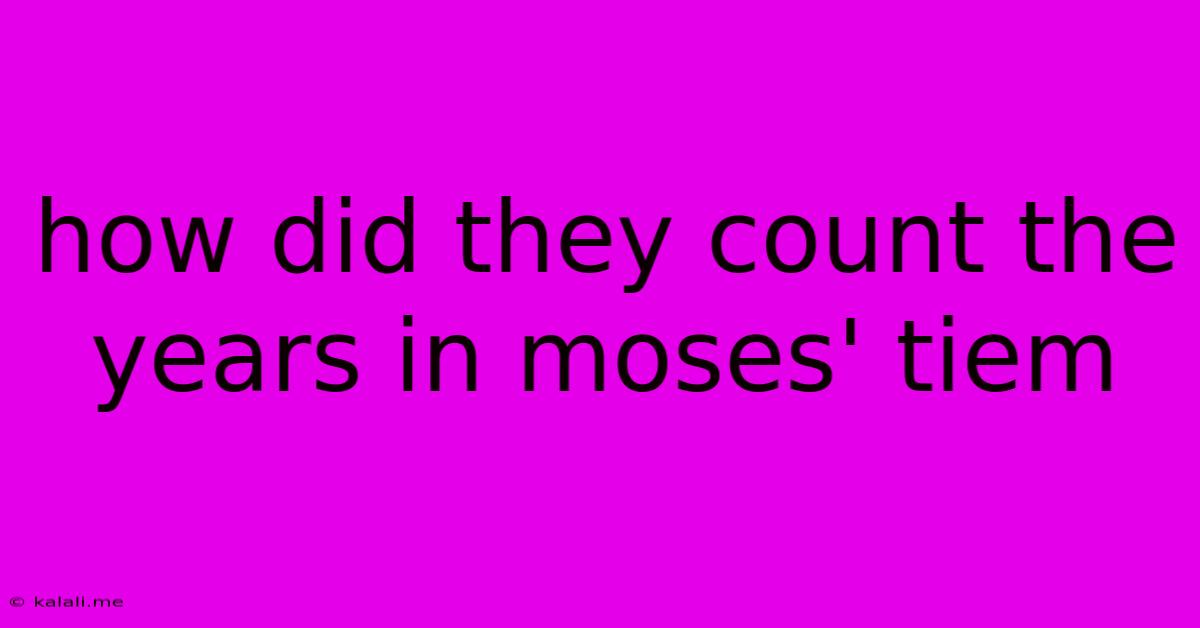How Did They Count The Years In Moses' Tiem
Kalali
Jun 04, 2025 · 3 min read

Table of Contents
How Did They Count the Years in Moses' Time? A Look at Chronology in Ancient Egypt and the Bronze Age
Determining the exact years during Moses' lifetime is a complex and often debated topic amongst historians and biblical scholars. There's no single, universally accepted calendar system from that era that we can directly compare to our modern Gregorian calendar. Understanding how time was tracked requires exploring the chronological systems of ancient Egypt and the broader Bronze Age context.
This article explores the challenges of dating events in the time of Moses, examining the available evidence and different approaches used by scholars. We will look at the limitations of ancient record-keeping and the various methods used to attempt to reconstruct a timeline.
The Lack of a Unified Calendar System
Unlike today, there wasn't a single, globally standardized calendar during the Bronze Age. Different civilizations used varying systems, often tied to local agricultural cycles, religious festivals, or the reigns of rulers. Ancient Egypt, a key player in the narrative of Moses, had its own sophisticated calendar, but even its application to specific dates presents challenges.
The Egyptian calendar was based on a solar year divided into twelve months of thirty days each, plus five intercalary days at the end, totaling 365 days. This system, while sophisticated, still deviated slightly from the actual solar year, leading to a gradual drift over time. Years were typically identified by the regnal years of the reigning pharaoh. For example, "Year 5 of Akhenaten's reign" would be a way of dating an event. However, even pinpointing the absolute dates of pharaohs' reigns can be tricky due to inconsistencies in historical records and debates among Egyptologists.
Connecting Biblical Narratives to Archaeological Evidence
Biblical accounts offer a framework for understanding the timeline of Moses' life, but their internal consistency and connection to external historical sources are matters of ongoing scholarly debate. The Exodus narrative, for example, often links events to specific pharaohs or periods of Egyptian history. However, archaeological evidence related to the Exodus itself remains inconclusive and interpretations vary widely.
Attempts to correlate biblical events with archaeological findings frequently involve analyzing pottery styles, architectural remains, and other artifacts. By comparing the artifacts found at different sites and their associated dating methods (like radiocarbon dating), researchers try to establish a chronological framework. However, the dating of these artifacts can have margins of error, adding further uncertainty.
Challenges and Limitations
Several factors significantly complicate the task of accurately dating events in Moses' time:
- Lack of Precise Dates in Biblical Texts: The Bible provides a narrative framework, but often lacks precise dates or chronological markers. Genealogies are present, but their interpretation is subject to different scholarly perspectives.
- Varied Interpretations of Biblical Texts: Different schools of biblical interpretation (e.g., literal, allegorical) lead to varying estimations of the timeline of events.
- Challenges in Archaeological Dating: Radiocarbon dating and other archaeological methods have inherent uncertainties, leading to potential discrepancies in the dating of artifacts related to the period.
- Limited Archival Records from the Bronze Age: The historical records from the Bronze Age are incomplete, and many civilizations' archives have been lost or destroyed over millennia.
Conclusion
Pinpointing the exact years of Moses' life is impossible with current knowledge. While the ancient Egyptian calendar offers a sophisticated framework, the lack of precise dates in the Bible, coupled with the inherent limitations of archaeological dating, presents significant obstacles. Scholars continue to debate these issues, employing diverse methodologies to reconstruct the timeline, but a definitive answer remains elusive. The chronology of this period is a work in progress, with ongoing research refining our understanding.
Latest Posts
Latest Posts
-
Can You Drive A Car Without A Catalytic Converter
Jun 06, 2025
-
How Do You Make Color White
Jun 06, 2025
-
You All O Sll Of You
Jun 06, 2025
-
How To Tie Fishing Hook On Line
Jun 06, 2025
-
Were All Of The Apostles Jewish
Jun 06, 2025
Related Post
Thank you for visiting our website which covers about How Did They Count The Years In Moses' Tiem . We hope the information provided has been useful to you. Feel free to contact us if you have any questions or need further assistance. See you next time and don't miss to bookmark.